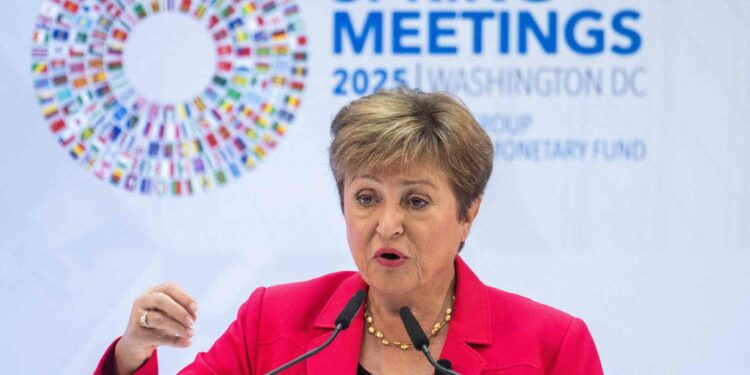4/17/2025–|Last update: 4/17/202507:52 PM (Mecca time)
The Director General of the International Monetary Fund, Crystalina Georgiva, said today, Thursday, that the escalation of trade tension and radical transformations in the global trade system will lead to a reduction in the economic expectations of the fund, but it is unlikely to reach a global recession.
The interview with the international official came at a press conference before the start of the spring meetings of the International Monetary Fund and the World Bank at the Fund’s headquarters in Washington.
Georgiviva added that the economies of countries face difficult tests at a time when the World Trade System has been reshaped for months due to American customs duties and reactions from China and the European Union.
According to Georgeva, this led to an “unprecedented” fog in commercial policy and severe fluctuations in the financial markets.
“The disturbances involve costs … Our new growth expectations will include noticeable discounts, but not a stagnation,” she said, adding that estimates will include the possibility of high inflation in some countries.
Georgiviva explained that the escalation of fog has increased the risk of pressure on the financial markets, noting that the movements of the curves of the returns of US treasury bonds recently must be considered a warning. “Everyone will suffer if the financial conditions are found,” she added.
At the beginning of this month, US President Donald Trump caused a great tremor in the global trade system through a new trade policy that included 10% customs duties on all countries, in addition to higher fees on each other, before their suspension for 90 days to provide the opportunity to negotiate. China, the European Union and other countries have announced counter -procedures.
In January, the IMF expected the global economy to grow by 3.3% in 2025 and 3.3% in 2026. The Fund will issue its updated estimates next Tuesday.
“While the giant countries are struggling, the smaller countries find themselves stuck in collided waves,” Georgiviva said. She added that China, the European Union and the United States are the three largest importers in the world, which means that the smaller and less able countries to facilitate financial policies will face great repercussions.



